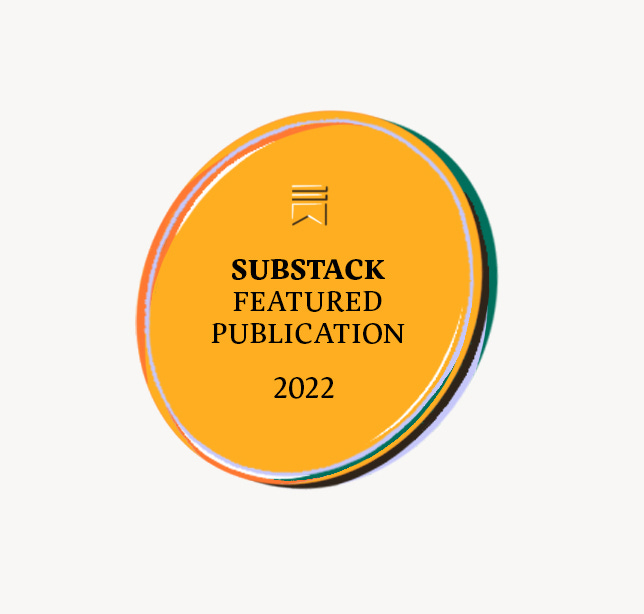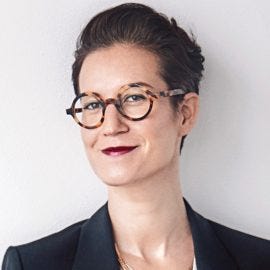Why Chills?
Journalism is too opaque and misunderstood. Chills gives a behind-the-scenes look at how dangerous investigative journalism gets made. I’m Lauren Wolfe and I’m here to talk about how to report on stories powerful people wish you wouldn’t.
I’ve been a journalist for more than 20 years, more than a decade of which I’ve spent reporting from war zones in which women and girls are ignored and violated, and, before that, five years documenting violence and the suppression of journalists globally. None of it has been easy, and I’m here to answer your questions about how I did it anyway.
In 2022, Substack nominated my work here for a Pulitzer.
If you care about press freedom and the experience of journalists and how we cover such difficult stories, this is the place for you. If you want to see how the reportage of a complex story is made, this is also the place for you. Welcome.
Praise for Chills
“You have given us a close look at the real ethical challenges faced by journalists & not the fabricated ones that have lately garnered more attention.”
“As always, riveting.”
“Reporting like this demonstrates the worth and integrity of journalism.”
“All of Chills is so well written and thought provoking. The subscription is well worth it!”
“It’s important [to give the insider view of journalism] and you’ve got a serious talent for it. If I were the Wizard of Oz, I wouldn't let you anywhere near my city.”
What you’ll get
I’ll tell you about what it’s like to write devastating articles and receive horrible backlash from people who wish you’d stayed quiet. What it was like to be arrested in the Democratic Republic of Congo in the course of six years of reporting on 50 little girls who were raped. What is was like to play an essential role in the arrest of the perpetrators. And what life was like for the girls and women I met in refugee camps at the Syrian border — underage and married off to foreigners. (Also, the time I needed to flee a city because Assad’s thugs were after me).
I’ll even tell you about what happened when former President Trump’s followers came after me. (Hint: It was nastier than anything I’d ever experienced before. Which, trust me, is saying a lot.)
Chills is where I will talk about trauma with my fellow journalists. Where I want to give space to people who have survived the worst evils and talk about how they did so. Where I can write about what we, as media people, are doing right — or wrong — and exactly how we do it.
Why should you pay for Chills?
Because I have to eat.
Chills is an important component of how this journalist makes her living. Some reasons to pay:
Your subscriptions pay for my investigative reporting, which, because of the kind of stories I report, is not cheap. (Flights, fixers, equipment, translators, time … here’s an example of how it breaks down.)
You’ll hear the dirt on the many flaws within the journalism industry from someone who’s been in it for two decades. (The dirt and how to fix it.)
Chills is an ongoing discussion of what journalism should look like in a time of broken trust.
I want to bring you more original reporting, and that requires your help. Thank you to everyone who has already upgraded to paid.
(All photos on Chills are copyrighted to me, unless otherwise credited.)
About Lauren
Lauren Wolfe is an award-winning journalist and photographer who has written for publications from The Atlantic to The Guardian. She is a contributing writer for Washington Monthly, and an adjunct professor at NYU’s graduate school of journalism.
She is a former columnist at Foreign Policy magazine, and director and creator of WMC WomenUnderSiegeProject.org, a journalism initiative on sexualized violence in conflict originated by Gloria Steinem at the Women’s Media Center in New York. The project included a live, crowd-sourced map of sexualized violence in Syria. She is also the creator and editor of WMC Climate, which positions the people climate change affects the most — women and people of color — front and center.
Wolfe was an editor and reporter for the live New York Times coverage of both the coronavirus and the presidential election in 2020.
From the BBC to CNN, she has spoken about her work on TV and radio internationally. In 2015, she testified before the UK House of Lords, and in 2012, she both testified at the United Nations on her team’s findings on rape in Syria and presented them to the UK Foreign and Commonwealth Office. She has conducted field reporting from the Middle East to Central Africa to Central America, interviewing hundreds of women and men suffering from the fallout of war. Wolfe also served on the advisory committee of the Nobel Women’s Initiative’s International Campaign to Stop Rape & Gender Violence in Conflict.
Previously, Wolfe was the senior editor of the Committee to Protect Journalists, where she focused on journalists and sexualized violence. Her CPJ report “The Silencing Crime” — for which she spoke to dozens of journalists around the world — broke ground in documenting the issue.
Wolfe spent three years at The New York Times reporting on September 11th for Times’ books 102 Minutes: The Fight to Survive Inside the Twin Towers—a 2005 National Book Award finalist—by Jim Dwyer and Kevin Flynn and City in the Sky: The Rise and Fall of the World Trade Center, by James Glanz and Eric Lipton.
In 2017, after a series of articles and photos in The Guardian and Foreign Policy magazine directly led to the arrest and conviction of a politician and members of his militia—they had been raping toddlers in eastern Congo for three years—she was named a finalist for the Anthony Shadid Award for Journalism Ethics, the Kurt Schork Memorial Award, and the One World Media Awards, and was called one of five journalists “making a big difference in the world” by Bono’s One.org. She is an inductee of the Ochberg Society for journalists who cover violence, has taught as an adjunct in Columbia’s Strategic Communications masters’ program, and been a fellow at the Blue Mountain Center.
She studied at Wesleyan University and Columbia University’s Graduate School of Journalism and is the recipient of four awards from the Society of Professional Journalists, two from the Fair Media Council, and of the 2012 Frank Ochberg Award for Media and Trauma Study. In 2014, she was given a “What Better Looks Like” Award for making a “compassionate and innovative contribution” to improving the world, and the Thomson Reuters Foundation named her a finalist for the Trust Women Journalist Award.
In 2013, Foreign Policy magazine named Wolfe one of its “FP Twitterati 100,” calling her an “authority on gender and conflict”; Action on Armed Violence included her in their list “Top 100: The Most Influential Journalists Covering Armed Violence”; and the UK’s Daily Telegraph named her “an awesome woman you need in your life on Twitter.”



